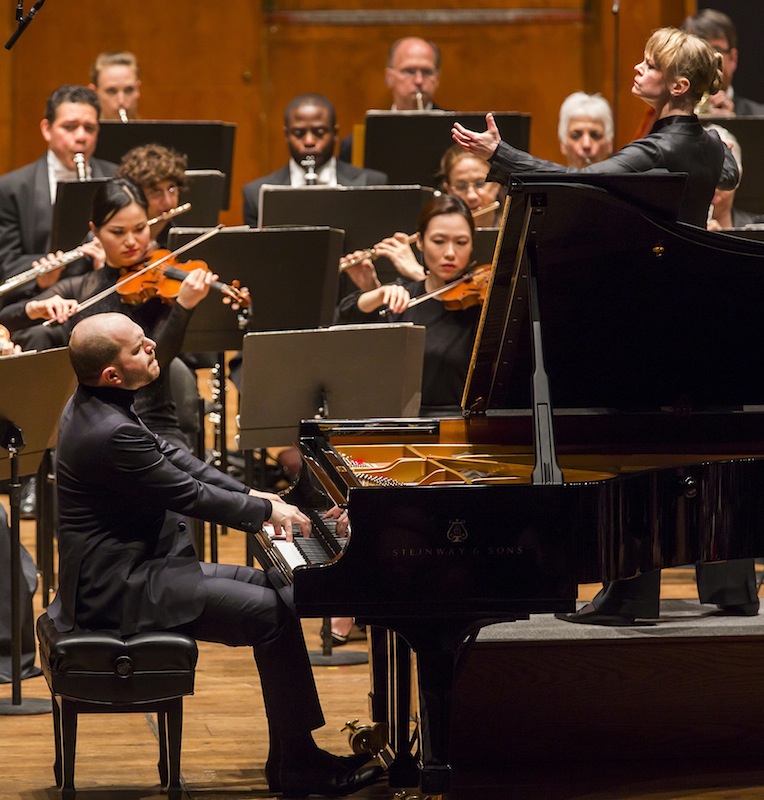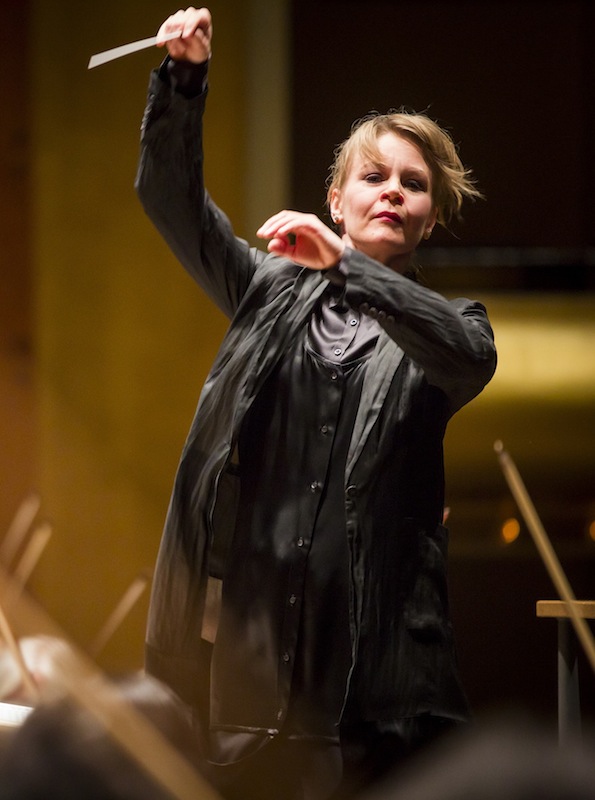Gerstein’s powerhouse Brahms proves the highlight of Mälkki’s Philharmonic debut

Kirill Gerstein performed Brahms’ Piano Concerto No. 1 with Susanna Mälkki conducting the New York Philharmonic Thursday night at Avery Fisher Hall. Photo: Chris Lee
A fifteen-minute standard concert opener followed by a fifteen-minute contemporary symphonic meditation, with a piano concerto on the second half: that’s a risky program. If the modern piece fails to win the audience, it leaves little meat above the break, and in either case it puts a good deal of pressure on the concerto soloist to deliver the sort of punch usually expected from a major symphonic work.
Brahms’s First Piano Concerto, of course, is the sort of weighty concerto that can fill that role, and Kirill Gerstein has the artistic chops to realize the piece’s potential. Gerstein still hasn’t quite cracked the A-list of celebrity pianists, and it’s hard to understand why. He combines musical intelligence and technical proficiency with playing that is boundlessly charismatic, even if his stage persona is rather unassuming.
On Thursday evening, performing with Susanna Mälkki and the New York Philharmonic, Gerstein demonstrated pianism of the highest order. He creates rich textures at the keyboard without sacrificing lyrical clarity, and varies his touch beautifully in the execution of a phrase. He showed singing grace in the opening Maestoso but was able to bring muscle when he needed it, matching the massive playing coming from Mälkki and the Philharmonic.
A noble, ruminative Adagio followed, breathing freely and perfectly paced. One extremely sour woodwind chord at the end left a bad impression, but Gerstein mitigated it by jumping into the Rondo before the moment had a chance to linger. Attacking the tricky passagework with a tempestuous spirit and guiding the whole movement with heroic virtuosity, Gerstein filled both the hall and the music with character. Mälkki’s firm hand kept the Philharmonic tight, collaborating sensitively with Gerstein and even showing a little bite in the last movement.
Still, the second half of the concert belonged to Gerstein, and the top half, alas, gave Mälkki little opportunity to show her mettle in her much-anticipated Philharmonic debut (some have conjectured, her Philharmonic audition). The late Jonathan Harvey’s 1998 Tranquil Abiding is music to daydream by. Its constant, gentle back-and-forth figure mimics the drawing and releasing of breath, introduced well below a pianissimo, and built so gradually that even when the piece reaches its loudest level, with blaring interjections of all kinds, a feeling of hypnotic calm persists. Mälkki controlled the arc perfectly, keeping the Philharmonic close the entire way.
Such was not the case in Brahms’s “St. Anthony” Variations (on the theme formerly attributed to Haydn). Right from the insufficiently lovely opening statement of the irresistibly lovely theme, the performance was flat. This is a playful piece, but on Thursday, sapped of the spark of imagination, it seemed deadly serious.
Mälkki’s direction was no less clear in this music than elsewhere. She gives a wide beat, but her gestures are precisely regimented, so that her intentions are discernible even twenty rows into the audience.
Somehow, though, communication between her and the orchestra was lacking. Ensemble came unglued in the fifth variation, which was more scrambling than fluttering. When she broadened her stroke and asked for more sound, the Philharmonic responded with only the faintest hint of a crescendo. In the finale, about which there was little sense of finality, the players seemed wholly uninterested in Mälkki’s brisker tempo.
Some of the most storied ensembles in the world are as renowned for their ornery dispositions as for their superb musicianship, and the New York Philharmonic certainly has not escaped that charge in the past. It would be a shame if that reputation reemerged just as the orchestra is trying to attract a new leader.
The program will be repeated 2 p.m. and 8 p.m. Saturday at Avery Fisher Hall. nyphil.org.







